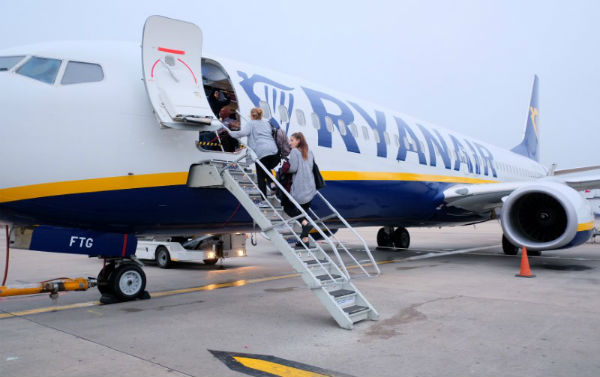Pilots in several countries had planned strikes

DUBLIN (Reuters) — Ryanair has offered to recognize pilot unions for the first time in its 32-year history in a last-minute bid to stop its first-ever pilot strike from taking place later on Friday.
Chief Executive Michael O'Leary's refusal to recognize unions was at the heart of the ultra-low-cost model he developed to turn a small Irish regional airline into Europe's largest carrier by passenger numbers.
"Recognizing unions will be a significant change for Ryanair, but we have delivered radical change before," O'Leary said in a statement. "We hope and expect that these structures can and will be agreed with our pilots early in the new year."
The move comes after Ryanair pilots in several countries threatened to strike in the busy run-up to Christmas, with the first by pilots and cabin crew in Italy on Friday.
A source for Italy's main pilot union ANPAC told Reuters the strike had been called off, but Italy's FIT-CISL transport union — which represents fewer pilots and some cabin crew — said the planned four-hour strike on Friday would go ahead.
It was not immediately clear if Ryanair's concession would be enough to stop a 24-hour stoppage by pilots in Ireland and Portugal on Dec. 20.
Ryanair's share price was down 2.4 per cent and is down more than four per cent since the start of the week.
The Irish carrier said it had sent a letter to unions in Ireland, Britain, Germany, Italy, Spain and Portugal on Friday to offer talks to formalize recognition and asking for confirmation that industrial action would not proceed.
Spanish union SEPLA and British counterpart BALPA said they were reviewing the offer, while unions in Ireland and Germany said they had not received it yet. There was no immediate comment from the unions in Italy and Portugal.
A Ryanair spokesman said the offer of recognition was so far just being made to pilots in the six countries, but "if other pilot unions who represent our pilots approach us, we will consider their request."
It was not clear if recognition will eventually be extended to other employees.
"If we’re recognizing pilot unions, then we’ll wait and see what comes in other parts of the workforce," Chief People Officer Eddie Wilson said.
He said, however, that he did not expect management would deal with an unofficial pan-European pilot body, the European Employee Representative Council (EERC), that pilots have formed in recent months.
"I think this EERC thing was always unworkable," he said. "I think ultimately what you will have is that unions are probably just interested in their own countries."
He said it was unclear if talks might lead to the concession of another demand by pilots: local contracts rather than the Irish contracts used across Ryanair's European bases.
"The unions will have that high on their agenda," he said. "We'll sit down and talk to them about it.
The pilots have mobilized in the wake of the announcement of 20,000 flight cancellations by the Irish carrier, which it blamed on a lack of standby pilots due to a failure in its rostering following a rule change by Irish regulators.
Pilot groups have said Ryanair is facing a major staffing shortage, but management has repeatedly denied this.
While pilots say pay and some conditions offered by Ryanair is competitive, many complain of a toxic work atmosphere and say that the collective bargaining system gives far too much power to management.
Ryanair says it is offering some of the best pay and conditions in the sector.
It recently brought back Peter Bellew, previously the CEO of Malaysia Airlines and Ryanair's former director of flight operations, to help deal with the staffing issue.
Chief People Officer Wilson said there was no reason to think costs would increase as a result of the move, but declined to comment on how the events of recent months might impact profitability.




